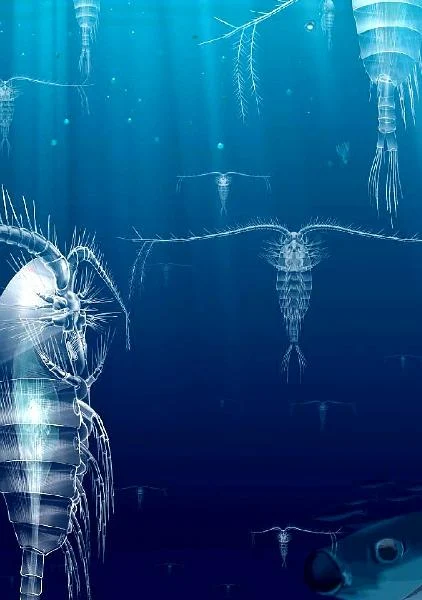 |
| Fonte: RUSS GEORGE |
The greatest migration on Earth.
Each day and night the sonars and other instruments reveal a rapid change in the bloom. As the phytoplankton bloom grows tiny zooplankton that graze upon those ocean plants respond both in number and behaviour.
These tiny ocean zooplankton, mixatrophs, will be seen and eaten if they are near the surface during daylight (or moonlight). To remain safe they hide in the deep dark waters and migrate to the surface only in the dark of night.
During daylight hours the zooplankton are 300+ meters down resting on the “deep thermocline” layer. As daylight wanes each evening their nightly migration to the surface pastures begins. There they engorge themselves with the blooms “fresh greens.” By morning light they swim back to the dark depths and safety where like bucolic cows they rest and digest.
The team is here to watch, measure, and captures samples of this ‘greatest migration’ on Earth. Russ George the chief scientist describes the spectacle, “It is as if we are perched in a tree on the great plains of Africa privileged to witness the great herds of beasts as they run past. Here there are animals of every size and shape albeit in mostly miniature planktonic forms. We see the salps, jellies, copepods, amphipods, krill, and more.” Mysteriously rare and missing are the pteropods but that’s another story.
Sea life from near and far are drawn to an ocean oasis.
That this wondrous plankton growth is beneficial is perfectly clear as is seen in the immediate shift from scarcity to abundance in sea life of all kinds. Spouting plumes of misty breath from the great whales, Fins, Seis, Sperms, and Orcas reveal the most obvious herds attracted to and now thriving on this renewed pasture. Two months ago, before the bloom, whale sightings were so few that not more than five or six were seen during weeks at sea. Now every day shows at least that many, some days whales are counted by the score.
Do or Do Naught
Ocean Pastures that sustain the greatest migration on earth have been turning into ever bluer ‘blue deserts’ for decades. Each year 1% of the plant-life of the oceans is lost due to our neglect of these vital pastures. To put that in context in every five year span of time the oceans lose the equivalent plant life to the entire Amazon Rainforest. We are all concerned about the fate of the Amazon which has lost 20% of its plant life. But since the 1950’s when records clearly show the loss of ocean pasture plant life at 1% per year we’ve lost 10 entire Amazon Rainforest’s of our vital ocean plant life. We can and must restore the ocean pastures! Join me.
Full article: Feeding the Greates Migration of Earth

Sem comentários:
Enviar um comentário
1) Identifique-se com o seu verdadeiro nome e sem abreviaturas.
2) Seja respeitoso e cordial, ainda que crítico.
3) São bem-vindas objecções, correcções factuais, contra-exemplos e discordâncias.